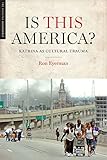Is This America? : Katrina as Cultural Trauma / Ron Eyerman.
Material type: TextSeries: The Katrina BookshelfPublisher: Austin : University of Texas Press, [2021]Copyright date: ©2015Description: 1 online resource (183 p.)Content type:
TextSeries: The Katrina BookshelfPublisher: Austin : University of Texas Press, [2021]Copyright date: ©2015Description: 1 online resource (183 p.)Content type: - 9781477307465
- Disaster victims -- United States -- Social conditions
- Disaster victims -- United States -- Social conditions
- Hurricane Katrina, 2005 -- Press coverage
- Hurricane Katrina, 2005 -- Social aspects
- Hurricane Katrina, 2005 -- Press coverage
- Hurricane Katrina, 2005 -- Social aspects
- Psychic trauma -- Social aspects -- Louisiana -- New Orleans
- Psychic trauma -- Social aspects -- Louisiana -- New Orleans
- Refugees -- Louisiana -- New Orleans -- Social conditions
- Refugees -- Louisiana -- New Orleans -- Social conditions
- Social problems -- Psychological aspects
- Social problems -- Psychological aspects
- SOCIAL SCIENCE / General
- 976/.044 23
- HV636 2005 .N4 E94 2015
- online - DeGruyter
| Item type | Current library | Call number | URL | Status | Notes | Barcode | |
|---|---|---|---|---|---|---|---|
 eBook
eBook
|
Biblioteca "Angelicum" Pont. Univ. S.Tommaso d'Aquino Nuvola online | online - DeGruyter (Browse shelf(Opens below)) | Online access | Not for loan (Accesso limitato) | Accesso per gli utenti autorizzati / Access for authorized users | (dgr)9781477307465 |
Browsing Biblioteca "Angelicum" Pont. Univ. S.Tommaso d'Aquino shelves, Shelving location: Nuvola online Close shelf browser (Hides shelf browser)

|

|

|

|

|

|

|
||
| online - DeGruyter Standing in the Need : Culture, Comfort, and Coming Home After Katrina / | online - DeGruyter Dirty Words and Filthy Pictures : Film and the First Amendment / | online - DeGruyter The Best I Recall : A Memoir / | online - DeGruyter Is This America? : Katrina as Cultural Trauma / | online - DeGruyter Photopoetics at Tlatelolco : Afterimages of Mexico, 1968 / | online - DeGruyter Muhammad in the Digital Age / | online - DeGruyter Cuban Underground Hip Hop : Black Thoughts, Black Revolution, Black Modernity / |
Frontmatter -- CONTENTS -- ACKNOWLEDGMENTS -- 1. Breaking the Covenant -- 2. Print Media -- 3. Arts and Popular Culture -- 4. Television Coverage -- Conclusion -- Notes -- BIBLIOGRAPHY -- ABOUT THE AUTHOR AND SERIES EDITOR -- INDEX
restricted access online access with authorization star
http://purl.org/coar/access_right/c_16ec
From police on the street, to the mayor of New Orleans and FEMA administrators, government officials monumentally failed to protect the most vulnerable residents of New Orleans and the Gulf Coast during the Katrina disaster. This violation of the social contract undermined the foundational narratives and myths of the American nation and spawned a profound, often contentious public debate over the meaning of Katrina’s devastation. A wide range of voices and images attempted to clarify what happened, name those responsible, identify the victims, and decide what should be done. This debate took place in forums ranging from mass media and the political arena to the arts and popular culture, as various narratives emerged and competed to tell the story of Katrina. Is This America? explores how Katrina has been constructed as a cultural trauma in print media, the arts and popular culture, and television coverage. Using stories told by the New York Times, New Orleans Times-Picayune, Time, Newsweek, NBC, and CNN, as well as the works of artists, writers, musicians, filmmakers, and graphic designers, Ron Eyerman analyzes how these narratives publicly articulated collective pain and loss. He demonstrates that, by exposing a foundational racial cleavage in American society, these expressions of cultural trauma turned individual experiences of suffering during Katrina into a national debate about the failure of the white majority in the United States to care about the black minority.
Mode of access: Internet via World Wide Web.
In English.
Description based on online resource; title from PDF title page (publisher's Web site, viewed 26. Apr 2022)


